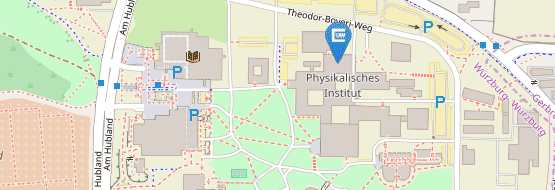SFB Extra Seminar
Interaction and hybridization of topologically protected edge states on the topological crystalline insulator PbSnSe(001) (Project A02)
| Date: | 07/04/2019, 4:15 PM - 6:00 PM |
| Category: | Seminar |
| Location: | Hubland Süd, Geb. P1 (Physik), SE 2 |
| Organizer: | SFB 1170 ToCoTronics |
| Speaker: | Johannes Jung - Universität Würzburg |
In the first funding period of our SFB we reported on the observation of one-dimensional electronic states which exist at odd step edges of the (001)-oriented topological crystalline insulator (TCI) (Pb,Sn)Se [1]. Our experiments showed that these edge states which evolve from the 2D surface of the topologically nontrivial host material are extraordinary robust to elevated temperatures and high magnetic fields. Maybe related to this finding, recent proposals claim that a hierarchy of topological states exists in topological nontrivial materials, resulting in protected states with a dimensionality d≤(n-2) , where n is the dimensionality of the host band structure [2]. In a recent publication [3] an even richer scenario was reported, where also even step edges exhibit an enhanced density of states near the Dirac point (DP).
, where n is the dimensionality of the host band structure [2]. In a recent publication [3] an even richer scenario was reported, where also even step edges exhibit an enhanced density of states near the Dirac point (DP).
Motivated by these unexpected findings, we performed a in-depth investigation of the interaction between the 1D edge states at odd step edges of cleaved (Pb,Sn)Se single crystals. Our results show that at large step-step distances above about 20 nm the characteristic single peak feature at the DP can be observed at either step. If the step-step distance decreases below this value, the peak splits into a double peak. Once the distance goes below a critical limit of about 5-10nm, the double peak feature vanishes and a spectrum reminiscent to the 2D surface remains. Systematic studies at wedge-shaped terraces indicate that the splitting is the result of hybridization.
Additionally we investigated Cu-doped surfaces, where Dirac electron-mediated interactions can take place if the DP is in close proximity to the Fermi level. Indeed, we observed a weak splitting of the 1D edge states in the order of a few meV observable in a narrow energy range (5-10 meV) around the Fermi level only.
- P. Sessi et al., Science 354, 1269 (2016)
- W. A. Benalcazar et al., Science 357, 61 (2017)
- D. Iaia et al., Phy. Rev. B, 99 155113 (2019)


